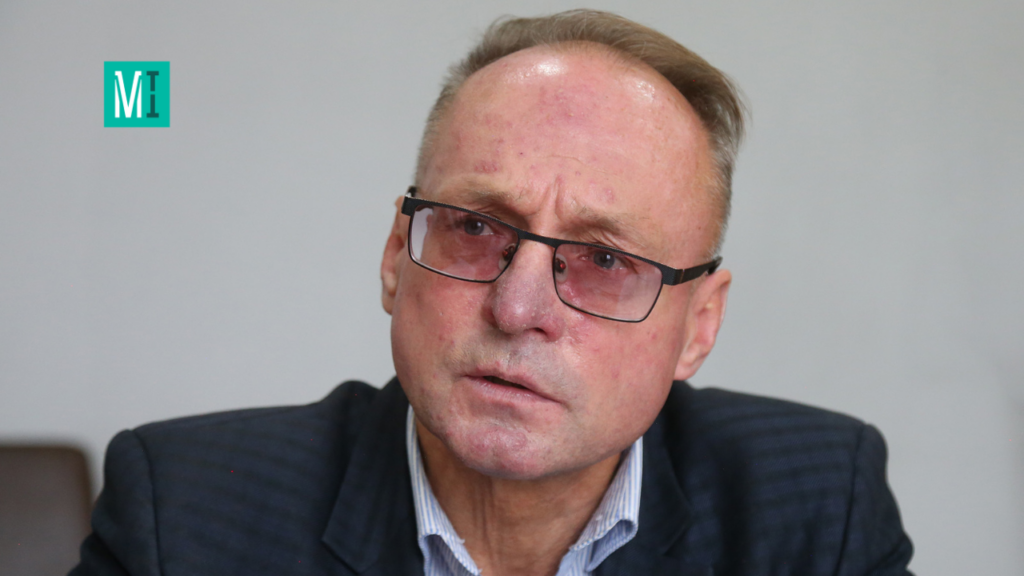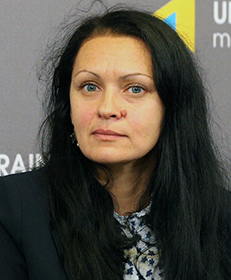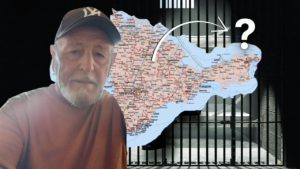The price of freedom: the story of Snovsk mayor’s release from captivity

Oleksandr Medvediov, mayor of Snovsk in Chernihiv Region, was taken hostage in March 2022 when Russian forces invaded the city. Captured by enemy soldiers, he endured several days in handcuffs, subjected to brutal interrogation and physical abuse, including a broken shoulder blade, and faced a ransom demand for his release.
The MIHR team conducted a field mission to Chernihiv Region, where they met with Oleksandr Medvediov to document the details of his abduction.
How did the full-scale invasion begin for you?
— On February 23, 2022, there was no information suggesting that the invasion would actually happen. My colleagues and I were at work. There were no instructions on what steps to take next. Our military enlistment office evacuated, and the security service and police switched to civilian clothes. We continued working as usual. The Russians didn’t come here directly; their convoys just passed by our location.

Snovsk Town Hall. Photo by Viktor Kovalchuk
Did you try to contact Chernihiv for instructions?
— We couldn’t establish contact with Chernihiv because they had their hands full as it was.
When there was heavy fighting around Kyiv and Chernihiv, did many people stay in Snovsk?
— Due to the heavy shelling in Chernihiv, many evacuated to Snovsk. Though the city wasn’t safe and Russians could have entered at any time, we still welcomed them. We used our school minibus to transport people from Chernihiv. As long as we had supplies like food and medicine, we continued our regular operations. After the bridges were destroyed, volunteers set up a ferry across the Snov River to bring in necessities. We experienced one instance of looting, but that was swiftly resolved. We organized patrols, and the police also joined in to maintain order.

Snovsk Mayor Oleksandr Medvediov. Photo by Viktor Kovalchuk
Russian forces entered Snovsk on the morning of March 25, 2022, initiating searches throughout the town, confiscating cell phones, and detaining individuals. On that day, Medvediov and his deputy went to their office where they were confronted by the occupiers. Despite pressure to cooperate, both refused. Subsequently, Medvediov’s personal documents and money were seized, and he was forcibly taken at gunpoint to an undisclosed location for interrogation. Medvediov noted the Russians’ surprising knowledge about him, including details about his family background, the fact that his mother hailed from Belarus and his father was Russian.
So, the Russians approached you to sway you to their side. What happened after your arrest?
— There were about ten or fifteen of them. One had black eyes and wore a black uniform. He turned out to be the cruelest among them. The rest wore camouflage. They forced me into a jeep, with these individuals on both sides. They knew quite a bit about me, so I shared what I knew: my wife works at a sports school, and my son studies at the National University of Physical Culture and Sports of Ukraine. When we crossed the railroad tracks, I realized I was being taken to Horodnia, a village neighboring Snovsk.

Horodnia and Snovsk on the map of Ukraine. Photo: Google map screenshot
So, you were taken to Horodnia right away?
— No, initially we headed towards Senkivka (a village near the Belarus border – MIHR). They had a trailer there, windowless and without light. They shoved me inside, and I stayed there for some time. Then, they moved me to the police station in Horodnia.
What were the conditions of your detention like?
— It was a typical cell: bunks, a sink, and a toilet, all filthy. It seemed someone had been detained there before me; there were cigarette butts and food scraps. I found a plastic one-and-a-half-liter bottle, which I cleaned to drink water from. The tap water was shut off periodically. They provided food until about 12 o’clock – some pate and bread. In the evening, around 18 o’clock, I received a bowl of porridge, presumably cooked for themselves. I had a plastic spoon, which I kept clean, but I constantly craved hot tea.
How did the Russians conduct the interrogations?
— For the first interrogation, they inquired about my identity and workplace. I was previously a customs colonel. The interrogation felt professional, distinctly different from the manner of my abduction.

Police precinct in Horodnia, where Oleksandr Medvediov was held in captivity. Photo by Viktor Kovalchuk
Why do you think the Russians were interested in the fact that you served in customs?
— Because customs officers have special ranks, and they think it’s the same as the military. I explained that it wasn’t true. I had the special rank of 3rd rank customs advisor. Yes, I had three stars, but we are not part of the military. They assumed we have the same system as in Russia, where customs ranks equate to military ranks.
Who were the people who interrogated you?
— I believe they were FSB officers because they were well-informed about me, the community, and clearly understood the local services, including the fact that a regional SBU office was located in our town.
What was the most frightening thing during your detention?
— The constant fear that they would kill me. Nearly every day, they threatened to execute me. It’s different if you know you’ll be held for a day or five and then released. But the constant fear, not just for myself but for my wife, colleagues, and everyone in Snovsk, was terrifying. I had no idea what was happening outside.
During the interrogations, Medvediov was pressed for information regarding Ukrainian military facilities, police officers, security service officers, and military enlistment offices. Despite not having such information, he faced relentless threats, including threats of execution. At one point, the severity of the interrogation led to his shoulder blade getting broken. Medvediov also recounted hearing the intense suffering screams of other Ukrainian captives being beaten cruelly in nearby cells.
The situation escalated when the Russian forces demanded a ransom of 15 thousand dollars for the mayor’s release. His deputy managed to gather the sum, and Medvediov’s wife, along with an acquaintance, arranged to pay the ransom, securing his freedom.
How did you find out about your release?
— For the last day or so, nobody visited me. They reduced my food portions. I heard a Ural truck start up and then silence. I was scared, thinking they had left me behind. But then the door opened, and the Russians came in, sat opposite me, and said they had decided to release me.
What happened when you were taken from Horodnia?
— I assumed I would be part of a prisoner exchange. But when I slightly lifted my hat, I saw jeans and women’s sneakers. I was surprised, thinking I was being exchanged for a woman.

MIHR fact-finding team during a meeting with the mayor of Snovsk. Photo by Viktor Kovalchuk
Who was that woman?
I thought she was the head of the community. And then she took me by the hand and said: “Sasha, let’s go”. It was my wife Nadia. We got into the car with her, but I was still scared. I said: “Nadia, you should probably get under the seat”. Because who knows what’s on their mind. I think they let us go, they’re not touching anyone, but what if they start shooting. But it was okay, we drove quickly down the highway. I said I didn’t understand anything, and my friend replied: “So we bought you out for 15 thousand”. I asked if it was in hryvnias. And they laughed at me.
How do you feel now, after your release?
My arm has healed, but the psychological impact came later. I often wake up at night and can’t sleep for hours, thinking I’m on a cell bunk. My blood pressure has risen, something I never experienced before. I’ve also started feeling heart palpitations. I’m not complaining, but I’ve recounted everything that happened to me, and I know these experiences will have a lasting effect. I constantly relive those moments in my head.
This article was prepared with contributions from Kateryna Ohiyevska and Polina Dobrozhanska.







